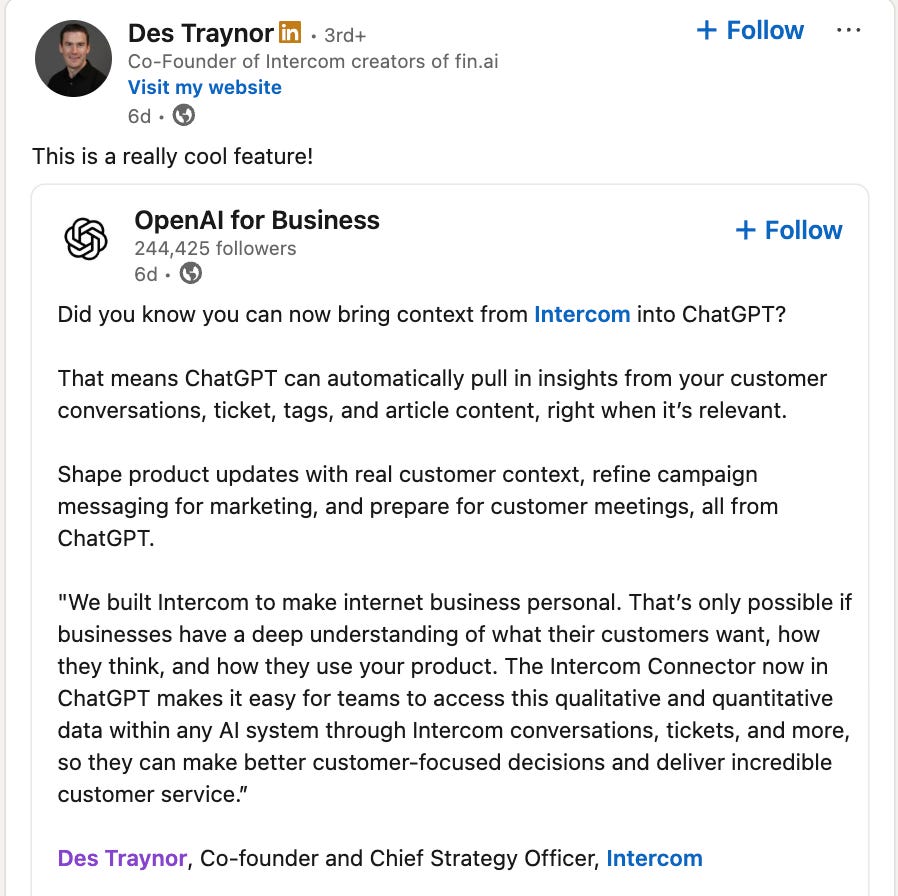Fin Sunday Edition #8
The further we grow, the closer the future feels.
It was a week of expansion and exploration. We put Berlin on our RnD map, got connected with OpenAI, and kept exploring what AI can do — and how we work with it.
This week on Ideas
Voice and role evolution took centre stage this week — designing AI that speaks with empathy, and rethinking what it means to “work in support”.
Designing for the spoken word
Recently, Des wrote about AI as a deeply convergent force, reversing decades of unbundling in software. Millions of web products and apps look set to be bundled into unified AI tools. As we think about the shapes those AI tools might take, we’re also considering
Principal AI Designer Molly explored the challenges of designing Fin Voice. Timing, turn-taking and resolutions matter, but perhaps what matters most is meeting human expectations where they are, and teaching them that great voice AI is possible.
While Molly focuses on how AI sounds, Brian looks at its echoes in the human world, as we start to see Fin reshaping some familiar roles.
Support teams are now AI product teams
Last week, Des wrote about AI as a deeply convergent force. He argued it’s reversing the last 20 years of software unbundling—that boatload of apps we all ended up with—and that the people who adapt first will have a massive opportunity.
He talks about how the people closest to customers are now the ones shaping, training, and improving their AI systems. It’s a sharp, practical look at how AI is tapping into support’s potential, turning it into a powerhouse of product innovation (say that five times fast).
Next stop: Berlin
Huge excitement when we shared that our next RnD hub will be in Berlin.
Hallo, Berlin
Speed is something we fight for every day at Intercom, and our next R&D hub is built for people who share that instinct. We intend to hire 100 people in Berlin over the year ahead across engineering, AI, data science, product, and design.
The plan: hire 100 people across AI, engineering, data science, product, and design over the next year. The reason: scale, speed, and proximity to some of the most interesting AI talent in Europe.
Berlin’s mix of technical ambition and creative edge fits our RnD culture perfectly — fast shipping, creative innovation, and bias for impact.
Moving in sync with OpenAI
Des shared our collaboration with OpenAI — and the direction customer AI is heading next.
He called the collaboration “a rare example of two companies at the intersection of research and application, moving in sync.”
“OpenAI’s latest updates — from model improvements to assistant APIs — open up a whole new level of reliability and reasoning for products like Fin.”
The keyword now and going forward is reliably — that’s something we’ll keep talking about in the coming weeks.
Notes from the near future
Some buzzy goings-on that caught our eyes and stuck in our brains this week.
Go-to-market experiments everywhere
Kyle Poyar’s 2025 State of B2B GTM Report landed this week, mapping the biggest shifts in how software companies grow. His read aligns neatly with many of our own experiments: shorter cycles, community-driven awareness, and AI-infused content loops. A worthwhile scan for anyone thinking about the next phase of GTM.
Hugging Face’s 214-page training opus
Hugging Face released The Smol Training Playbook — a 214-page manual on how to train state-of-the-art language models. We were gobbling this up: it’s a great account of the messy realities behind modern model training. We love to see this level of thinking shared, just as we share our research.
Neo woke up
1X Technologies unveiled Neo, a general-purpose home robot with a distinctive (dare we say cuddly?) hand-sewn aesthetic and… interesting manner of movement that was custom designed to go viral.
Our parting thought
All AI work is lab work, with a thousand experiments running at once. No matter how uncanny, wild or improbable, we love seeing new ideas come over the top every week. More, please.
See you next Sunday.







Thanks for writing this, which clarifies a lot, because the AI convergence and its transformative impac on human roles and design for empathy is truly profound.